Demonstrating Professional Principles in HSC Practices
VerifiedAdded on 2020/10/23
|18
|5435
|195
Report
AI Summary
This report provides a comprehensive overview of reflective practice within the health and social care (HSC) sector. It begins by defining reflective practice and its significance in HSC, emphasizing its role in continuous learning and improved healthcare practices. The report then delves into the Gibbs reflective model and other tools used in healthcare settings. A skills audit, utilizing the SWOT analysis, is presented to evaluate strengths, weaknesses, opportunities, and threats relevant to HSC professionals. A detailed professional development plan (PDP) outlines specific goals and strategies for career advancement. The report further examines practice themes implemented in the HSC workplace, focusing on regulations, ethical considerations, and professional behaviors. Finally, the document concludes with a portfolio and reflective report, summarizing key findings and insights gained throughout the study. This report aims to assist students in understanding and applying professional principles and values in their HSC practices.
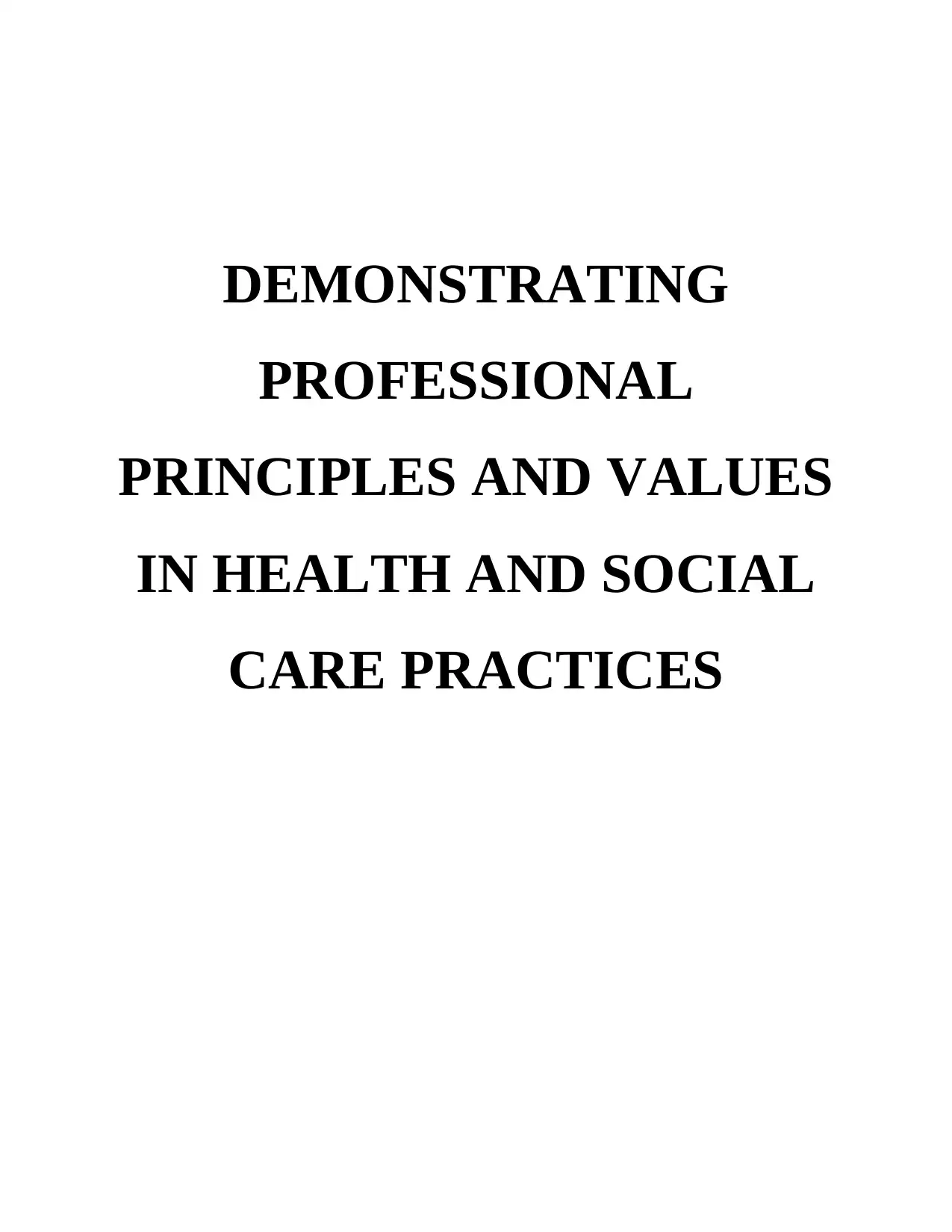
DEMONSTRATING
PROFESSIONAL
PRINCIPLES AND VALUES
IN HEALTH AND SOCIAL
CARE PRACTICES
PROFESSIONAL
PRINCIPLES AND VALUES
IN HEALTH AND SOCIAL
CARE PRACTICES
Paraphrase This Document
Need a fresh take? Get an instant paraphrase of this document with our AI Paraphraser
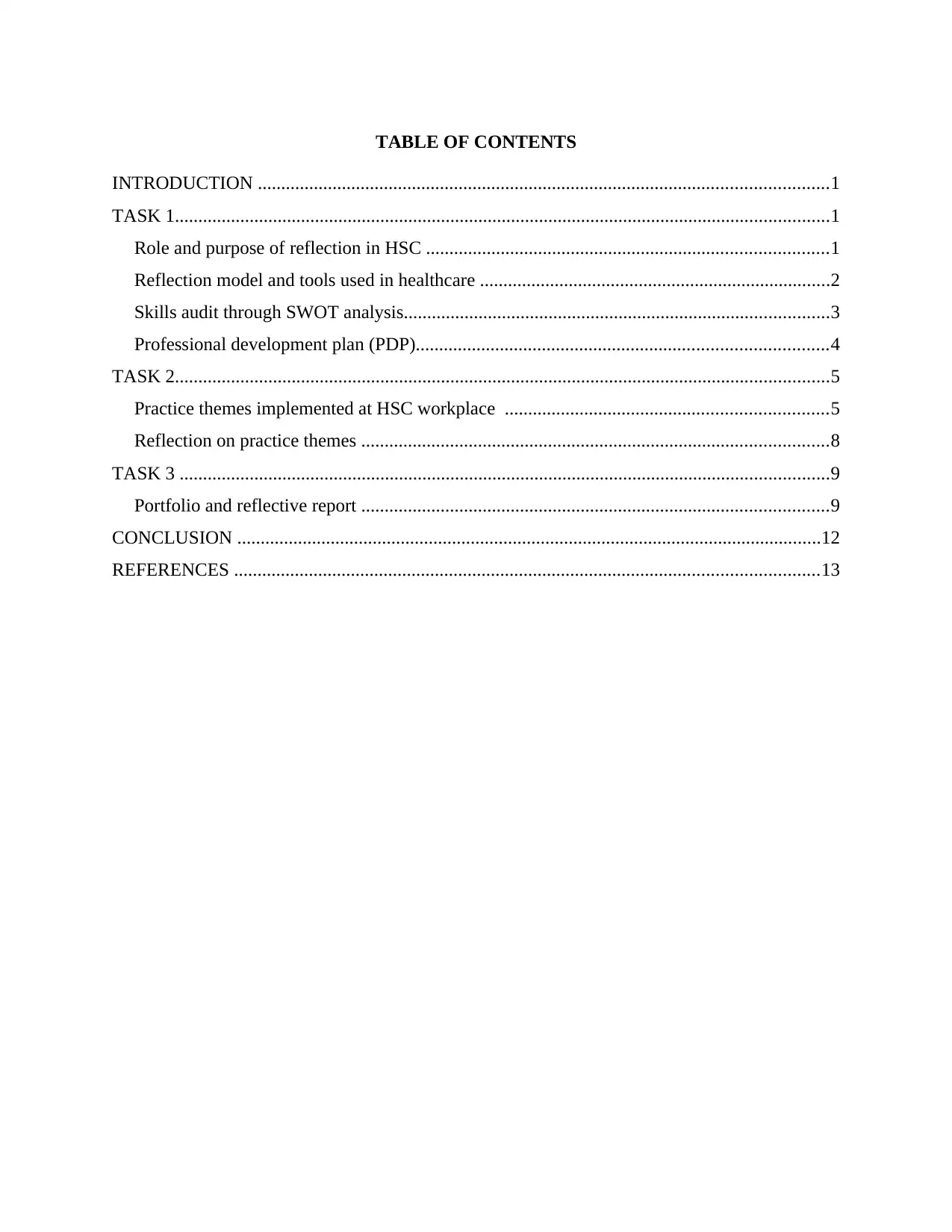
TABLE OF CONTENTS
INTRODUCTION ..........................................................................................................................1
TASK 1............................................................................................................................................1
Role and purpose of reflection in HSC ......................................................................................1
Reflection model and tools used in healthcare ...........................................................................2
Skills audit through SWOT analysis...........................................................................................3
Professional development plan (PDP)........................................................................................4
TASK 2............................................................................................................................................5
Practice themes implemented at HSC workplace .....................................................................5
Reflection on practice themes ....................................................................................................8
TASK 3 ...........................................................................................................................................9
Portfolio and reflective report ....................................................................................................9
CONCLUSION .............................................................................................................................12
REFERENCES .............................................................................................................................13
INTRODUCTION ..........................................................................................................................1
TASK 1............................................................................................................................................1
Role and purpose of reflection in HSC ......................................................................................1
Reflection model and tools used in healthcare ...........................................................................2
Skills audit through SWOT analysis...........................................................................................3
Professional development plan (PDP)........................................................................................4
TASK 2............................................................................................................................................5
Practice themes implemented at HSC workplace .....................................................................5
Reflection on practice themes ....................................................................................................8
TASK 3 ...........................................................................................................................................9
Portfolio and reflective report ....................................................................................................9
CONCLUSION .............................................................................................................................12
REFERENCES .............................................................................................................................13
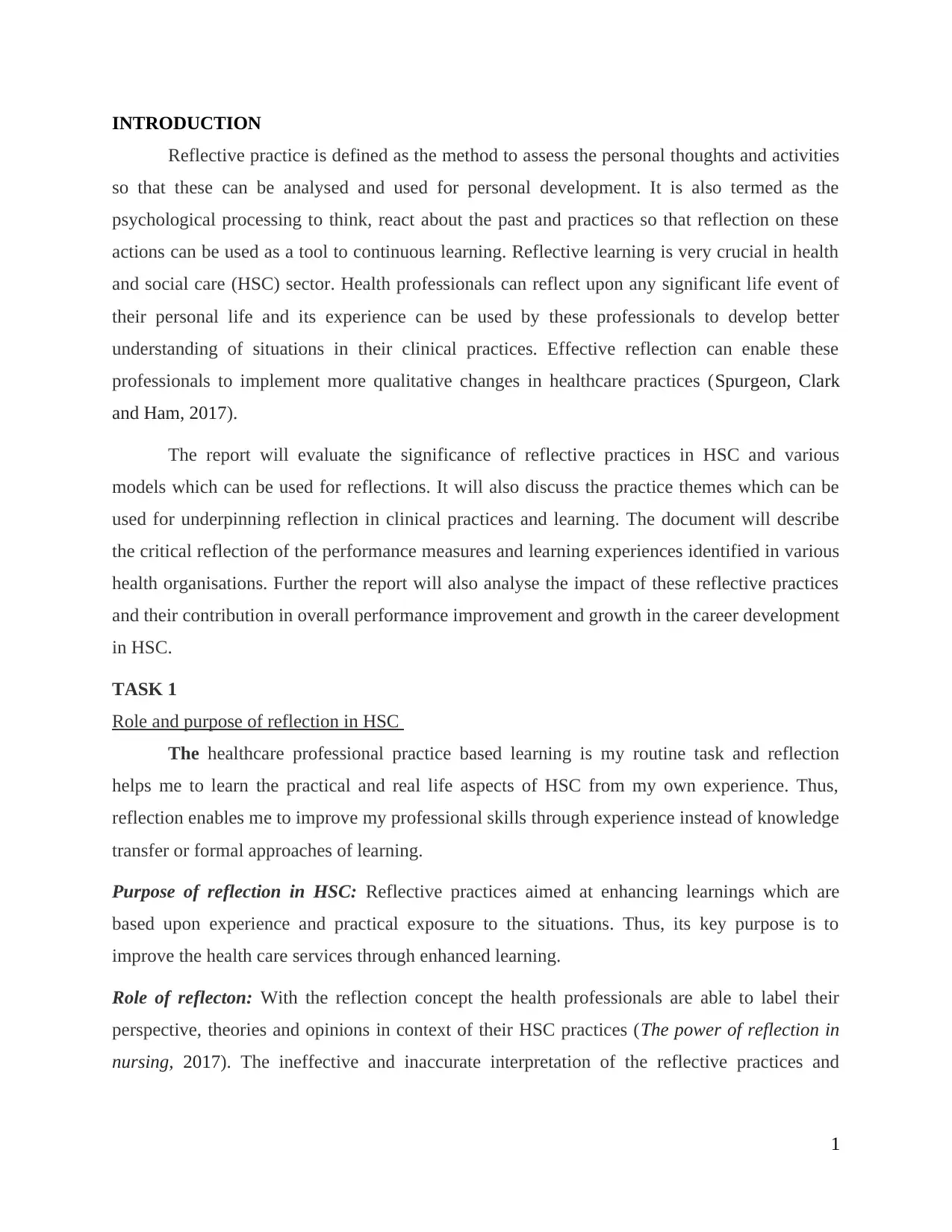
INTRODUCTION
Reflective practice is defined as the method to assess the personal thoughts and activities
so that these can be analysed and used for personal development. It is also termed as the
psychological processing to think, react about the past and practices so that reflection on these
actions can be used as a tool to continuous learning. Reflective learning is very crucial in health
and social care (HSC) sector. Health professionals can reflect upon any significant life event of
their personal life and its experience can be used by these professionals to develop better
understanding of situations in their clinical practices. Effective reflection can enable these
professionals to implement more qualitative changes in healthcare practices (Spurgeon, Clark
and Ham, 2017).
The report will evaluate the significance of reflective practices in HSC and various
models which can be used for reflections. It will also discuss the practice themes which can be
used for underpinning reflection in clinical practices and learning. The document will describe
the critical reflection of the performance measures and learning experiences identified in various
health organisations. Further the report will also analyse the impact of these reflective practices
and their contribution in overall performance improvement and growth in the career development
in HSC.
TASK 1
Role and purpose of reflection in HSC
The healthcare professional practice based learning is my routine task and reflection
helps me to learn the practical and real life aspects of HSC from my own experience. Thus,
reflection enables me to improve my professional skills through experience instead of knowledge
transfer or formal approaches of learning.
Purpose of reflection in HSC: Reflective practices aimed at enhancing learnings which are
based upon experience and practical exposure to the situations. Thus, its key purpose is to
improve the health care services through enhanced learning.
Role of reflecton: With the reflection concept the health professionals are able to label their
perspective, theories and opinions in context of their HSC practices (The power of reflection in
nursing, 2017). The ineffective and inaccurate interpretation of the reflective practices and
1
Reflective practice is defined as the method to assess the personal thoughts and activities
so that these can be analysed and used for personal development. It is also termed as the
psychological processing to think, react about the past and practices so that reflection on these
actions can be used as a tool to continuous learning. Reflective learning is very crucial in health
and social care (HSC) sector. Health professionals can reflect upon any significant life event of
their personal life and its experience can be used by these professionals to develop better
understanding of situations in their clinical practices. Effective reflection can enable these
professionals to implement more qualitative changes in healthcare practices (Spurgeon, Clark
and Ham, 2017).
The report will evaluate the significance of reflective practices in HSC and various
models which can be used for reflections. It will also discuss the practice themes which can be
used for underpinning reflection in clinical practices and learning. The document will describe
the critical reflection of the performance measures and learning experiences identified in various
health organisations. Further the report will also analyse the impact of these reflective practices
and their contribution in overall performance improvement and growth in the career development
in HSC.
TASK 1
Role and purpose of reflection in HSC
The healthcare professional practice based learning is my routine task and reflection
helps me to learn the practical and real life aspects of HSC from my own experience. Thus,
reflection enables me to improve my professional skills through experience instead of knowledge
transfer or formal approaches of learning.
Purpose of reflection in HSC: Reflective practices aimed at enhancing learnings which are
based upon experience and practical exposure to the situations. Thus, its key purpose is to
improve the health care services through enhanced learning.
Role of reflecton: With the reflection concept the health professionals are able to label their
perspective, theories and opinions in context of their HSC practices (The power of reflection in
nursing, 2017). The ineffective and inaccurate interpretation of the reflective practices and
1
⊘ This is a preview!⊘
Do you want full access?
Subscribe today to unlock all pages.

Trusted by 1+ million students worldwide
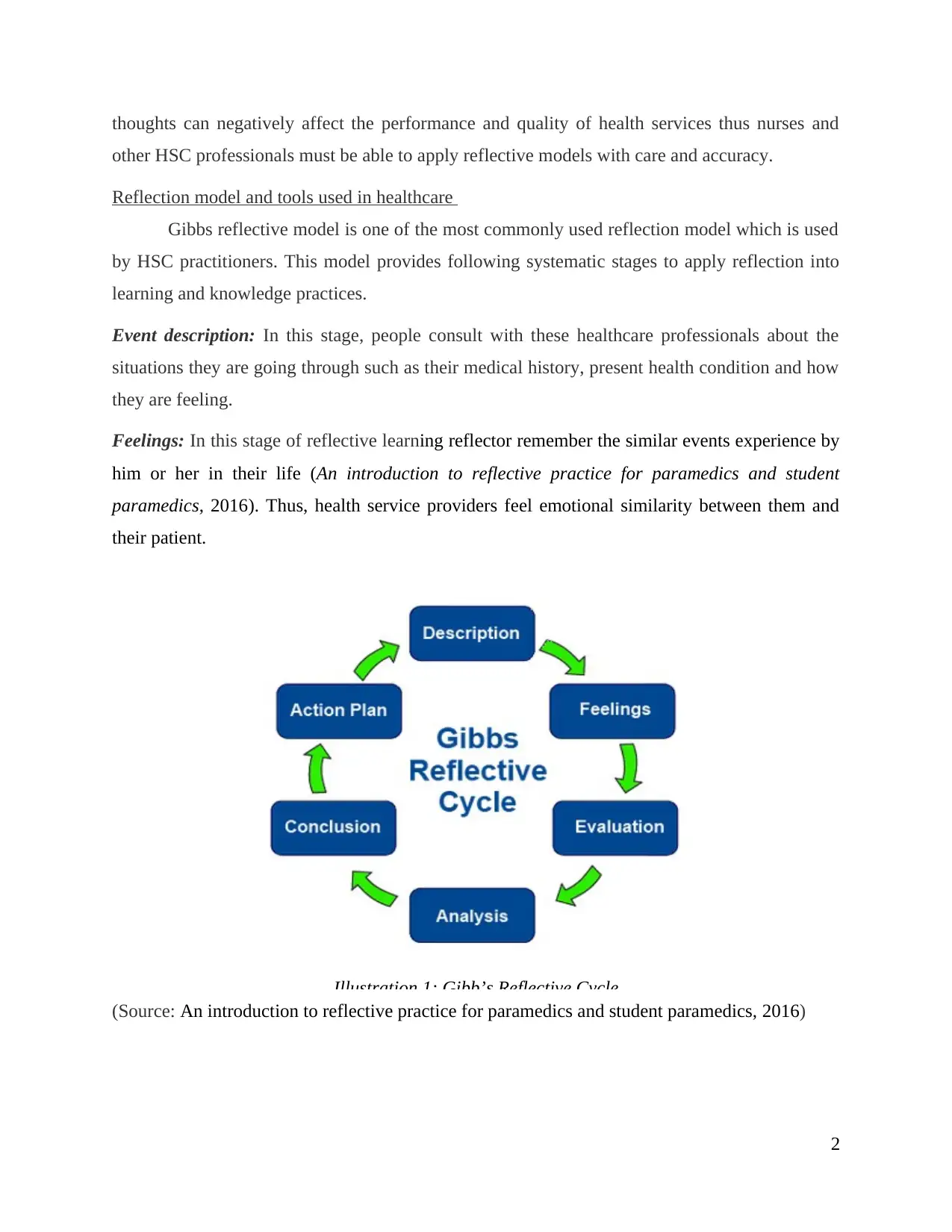
thoughts can negatively affect the performance and quality of health services thus nurses and
other HSC professionals must be able to apply reflective models with care and accuracy.
Reflection model and tools used in healthcare
Gibbs reflective model is one of the most commonly used reflection model which is used
by HSC practitioners. This model provides following systematic stages to apply reflection into
learning and knowledge practices.
Event description: In this stage, people consult with these healthcare professionals about the
situations they are going through such as their medical history, present health condition and how
they are feeling.
Feelings: In this stage of reflective learning reflector remember the similar events experience by
him or her in their life (An introduction to reflective practice for paramedics and student
paramedics, 2016). Thus, health service providers feel emotional similarity between them and
their patient.
(Source: An introduction to reflective practice for paramedics and student paramedics, 2016)
2
Illustration 1: Gibb’s Reflective Cycle
other HSC professionals must be able to apply reflective models with care and accuracy.
Reflection model and tools used in healthcare
Gibbs reflective model is one of the most commonly used reflection model which is used
by HSC practitioners. This model provides following systematic stages to apply reflection into
learning and knowledge practices.
Event description: In this stage, people consult with these healthcare professionals about the
situations they are going through such as their medical history, present health condition and how
they are feeling.
Feelings: In this stage of reflective learning reflector remember the similar events experience by
him or her in their life (An introduction to reflective practice for paramedics and student
paramedics, 2016). Thus, health service providers feel emotional similarity between them and
their patient.
(Source: An introduction to reflective practice for paramedics and student paramedics, 2016)
2
Illustration 1: Gibb’s Reflective Cycle
Paraphrase This Document
Need a fresh take? Get an instant paraphrase of this document with our AI Paraphraser
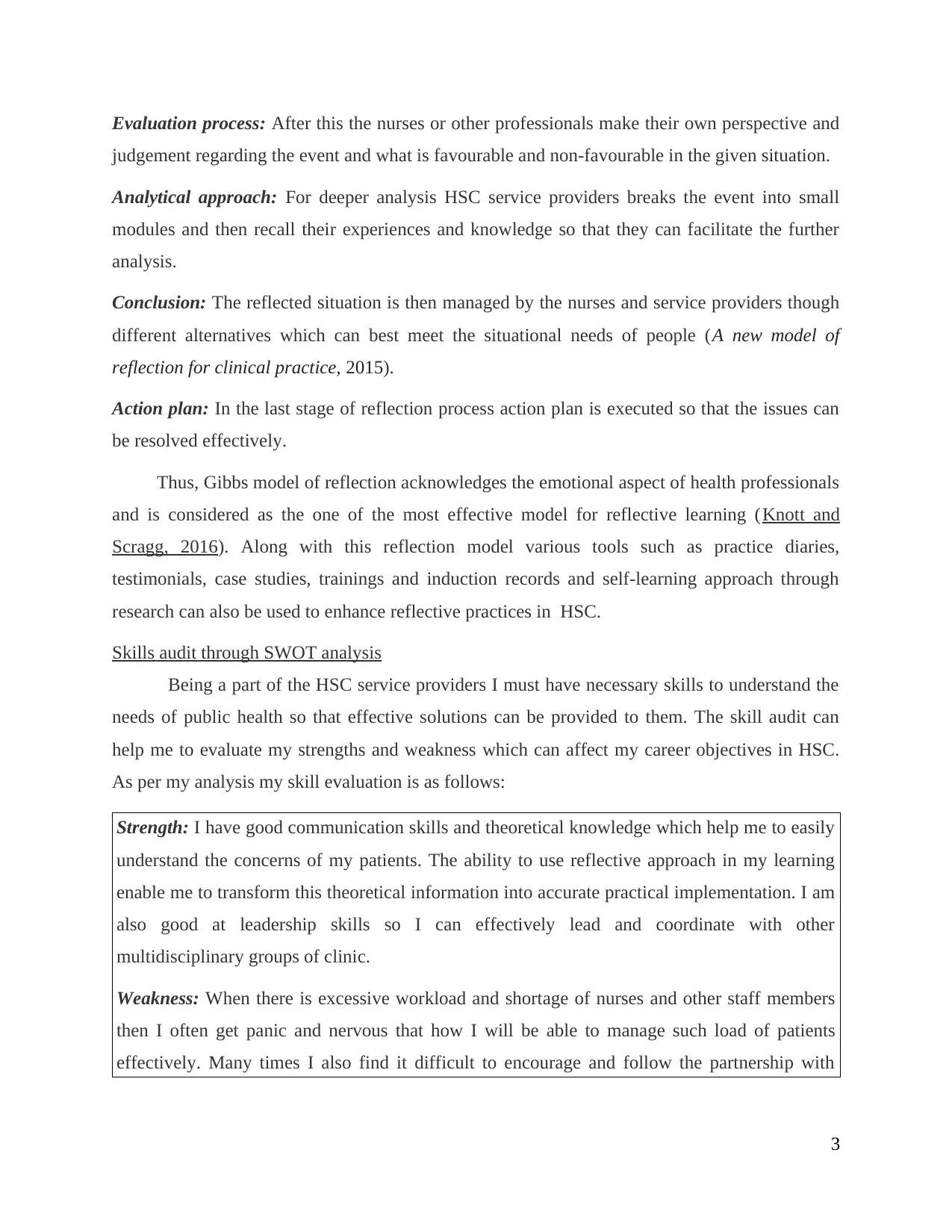
Evaluation process: After this the nurses or other professionals make their own perspective and
judgement regarding the event and what is favourable and non-favourable in the given situation.
Analytical approach: For deeper analysis HSC service providers breaks the event into small
modules and then recall their experiences and knowledge so that they can facilitate the further
analysis.
Conclusion: The reflected situation is then managed by the nurses and service providers though
different alternatives which can best meet the situational needs of people (A new model of
reflection for clinical practice, 2015).
Action plan: In the last stage of reflection process action plan is executed so that the issues can
be resolved effectively.
Thus, Gibbs model of reflection acknowledges the emotional aspect of health professionals
and is considered as the one of the most effective model for reflective learning (Knott and
Scragg, 2016). Along with this reflection model various tools such as practice diaries,
testimonials, case studies, trainings and induction records and self-learning approach through
research can also be used to enhance reflective practices in HSC.
Skills audit through SWOT analysis
Being a part of the HSC service providers I must have necessary skills to understand the
needs of public health so that effective solutions can be provided to them. The skill audit can
help me to evaluate my strengths and weakness which can affect my career objectives in HSC.
As per my analysis my skill evaluation is as follows:
Strength: I have good communication skills and theoretical knowledge which help me to easily
understand the concerns of my patients. The ability to use reflective approach in my learning
enable me to transform this theoretical information into accurate practical implementation. I am
also good at leadership skills so I can effectively lead and coordinate with other
multidisciplinary groups of clinic.
Weakness: When there is excessive workload and shortage of nurses and other staff members
then I often get panic and nervous that how I will be able to manage such load of patients
effectively. Many times I also find it difficult to encourage and follow the partnership with
3
judgement regarding the event and what is favourable and non-favourable in the given situation.
Analytical approach: For deeper analysis HSC service providers breaks the event into small
modules and then recall their experiences and knowledge so that they can facilitate the further
analysis.
Conclusion: The reflected situation is then managed by the nurses and service providers though
different alternatives which can best meet the situational needs of people (A new model of
reflection for clinical practice, 2015).
Action plan: In the last stage of reflection process action plan is executed so that the issues can
be resolved effectively.
Thus, Gibbs model of reflection acknowledges the emotional aspect of health professionals
and is considered as the one of the most effective model for reflective learning (Knott and
Scragg, 2016). Along with this reflection model various tools such as practice diaries,
testimonials, case studies, trainings and induction records and self-learning approach through
research can also be used to enhance reflective practices in HSC.
Skills audit through SWOT analysis
Being a part of the HSC service providers I must have necessary skills to understand the
needs of public health so that effective solutions can be provided to them. The skill audit can
help me to evaluate my strengths and weakness which can affect my career objectives in HSC.
As per my analysis my skill evaluation is as follows:
Strength: I have good communication skills and theoretical knowledge which help me to easily
understand the concerns of my patients. The ability to use reflective approach in my learning
enable me to transform this theoretical information into accurate practical implementation. I am
also good at leadership skills so I can effectively lead and coordinate with other
multidisciplinary groups of clinic.
Weakness: When there is excessive workload and shortage of nurses and other staff members
then I often get panic and nervous that how I will be able to manage such load of patients
effectively. Many times I also find it difficult to encourage and follow the partnership with
3
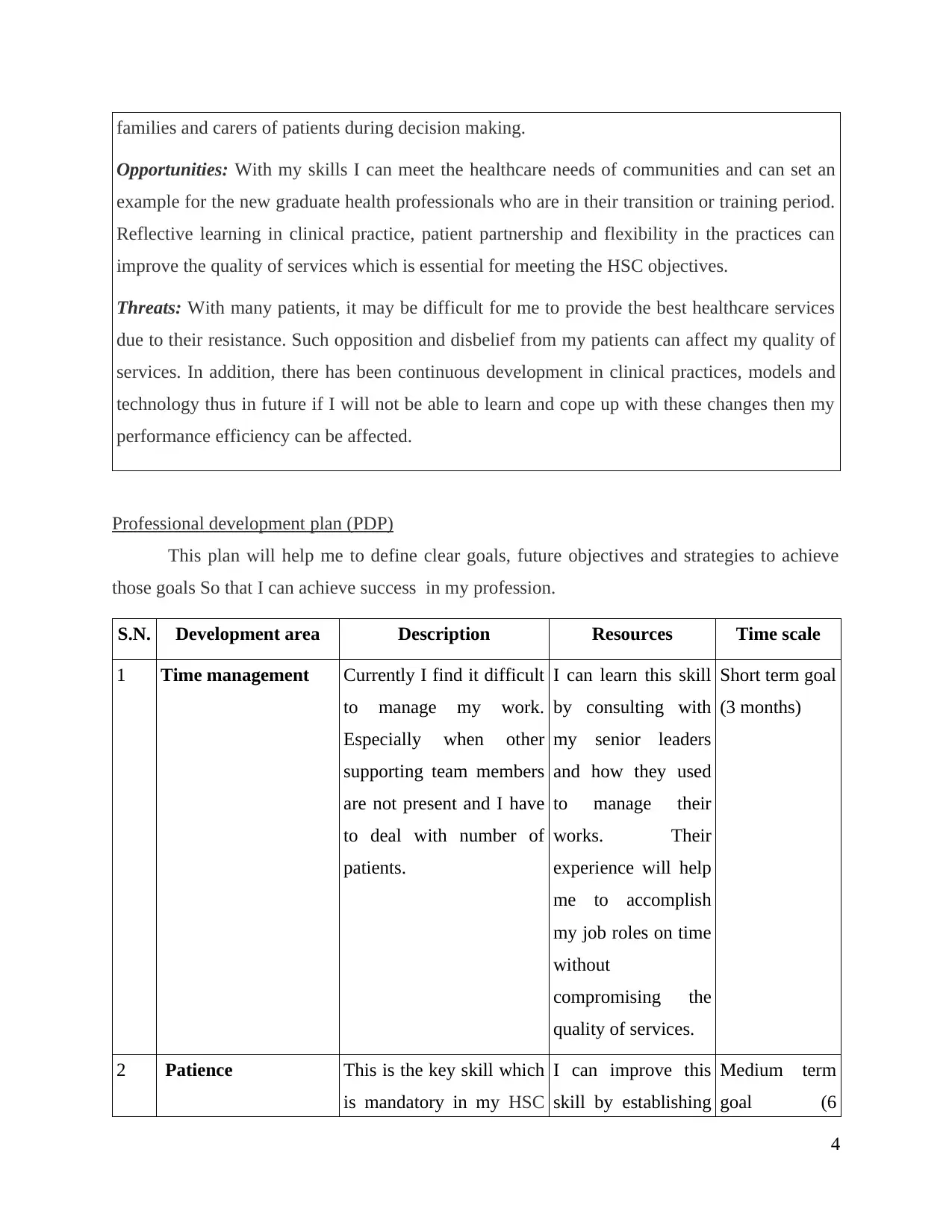
families and carers of patients during decision making.
Opportunities: With my skills I can meet the healthcare needs of communities and can set an
example for the new graduate health professionals who are in their transition or training period.
Reflective learning in clinical practice, patient partnership and flexibility in the practices can
improve the quality of services which is essential for meeting the HSC objectives.
Threats: With many patients, it may be difficult for me to provide the best healthcare services
due to their resistance. Such opposition and disbelief from my patients can affect my quality of
services. In addition, there has been continuous development in clinical practices, models and
technology thus in future if I will not be able to learn and cope up with these changes then my
performance efficiency can be affected.
Professional development plan (PDP)
This plan will help me to define clear goals, future objectives and strategies to achieve
those goals So that I can achieve success in my profession.
S.N. Development area Description Resources Time scale
1 Time management Currently I find it difficult
to manage my work.
Especially when other
supporting team members
are not present and I have
to deal with number of
patients.
I can learn this skill
by consulting with
my senior leaders
and how they used
to manage their
works. Their
experience will help
me to accomplish
my job roles on time
without
compromising the
quality of services.
Short term goal
(3 months)
2 Patience This is the key skill which
is mandatory in my HSC
I can improve this
skill by establishing
Medium term
goal (6
4
Opportunities: With my skills I can meet the healthcare needs of communities and can set an
example for the new graduate health professionals who are in their transition or training period.
Reflective learning in clinical practice, patient partnership and flexibility in the practices can
improve the quality of services which is essential for meeting the HSC objectives.
Threats: With many patients, it may be difficult for me to provide the best healthcare services
due to their resistance. Such opposition and disbelief from my patients can affect my quality of
services. In addition, there has been continuous development in clinical practices, models and
technology thus in future if I will not be able to learn and cope up with these changes then my
performance efficiency can be affected.
Professional development plan (PDP)
This plan will help me to define clear goals, future objectives and strategies to achieve
those goals So that I can achieve success in my profession.
S.N. Development area Description Resources Time scale
1 Time management Currently I find it difficult
to manage my work.
Especially when other
supporting team members
are not present and I have
to deal with number of
patients.
I can learn this skill
by consulting with
my senior leaders
and how they used
to manage their
works. Their
experience will help
me to accomplish
my job roles on time
without
compromising the
quality of services.
Short term goal
(3 months)
2 Patience This is the key skill which
is mandatory in my HSC
I can improve this
skill by establishing
Medium term
goal (6
4
⊘ This is a preview!⊘
Do you want full access?
Subscribe today to unlock all pages.

Trusted by 1+ million students worldwide
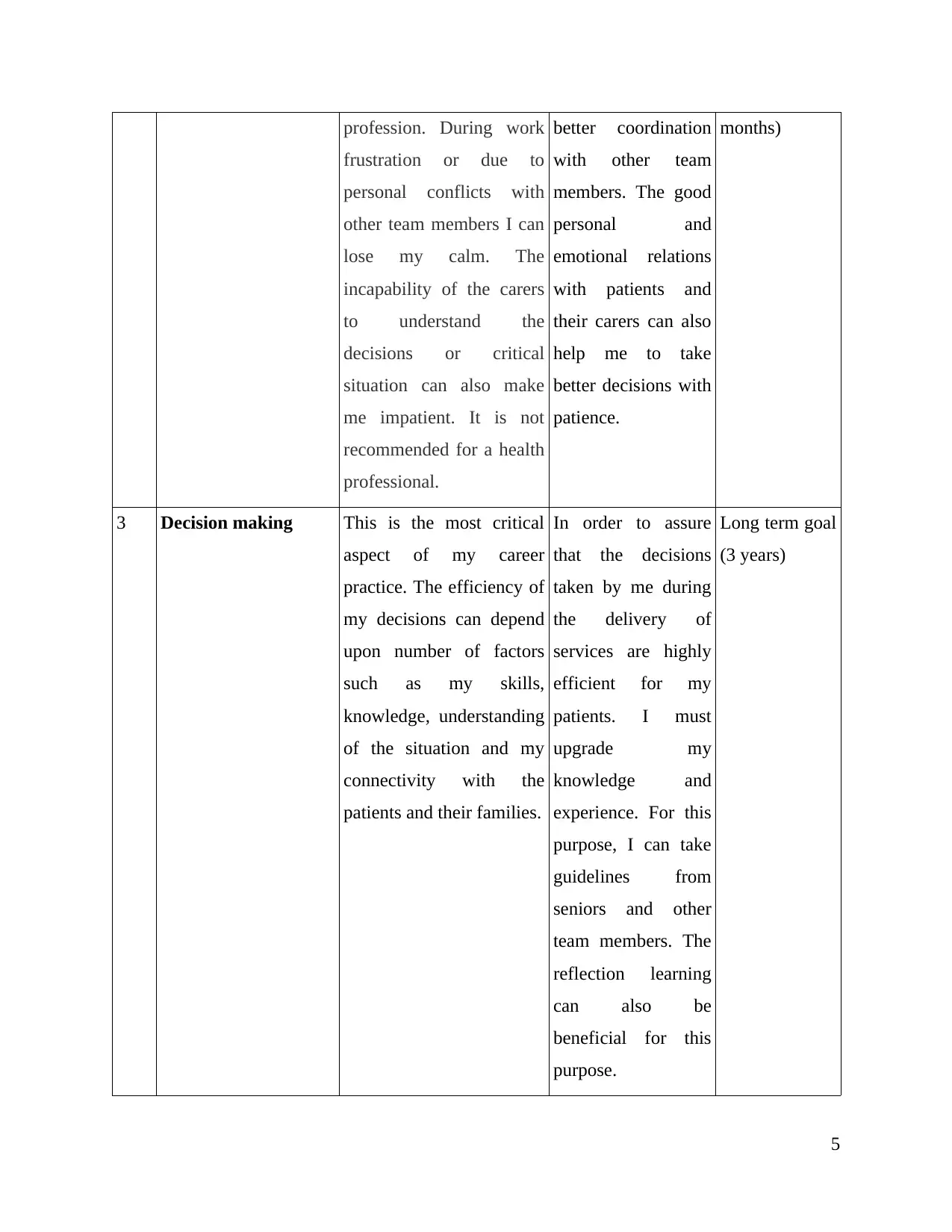
profession. During work
frustration or due to
personal conflicts with
other team members I can
lose my calm. The
incapability of the carers
to understand the
decisions or critical
situation can also make
me impatient. It is not
recommended for a health
professional.
better coordination
with other team
members. The good
personal and
emotional relations
with patients and
their carers can also
help me to take
better decisions with
patience.
months)
3 Decision making This is the most critical
aspect of my career
practice. The efficiency of
my decisions can depend
upon number of factors
such as my skills,
knowledge, understanding
of the situation and my
connectivity with the
patients and their families.
In order to assure
that the decisions
taken by me during
the delivery of
services are highly
efficient for my
patients. I must
upgrade my
knowledge and
experience. For this
purpose, I can take
guidelines from
seniors and other
team members. The
reflection learning
can also be
beneficial for this
purpose.
Long term goal
(3 years)
5
frustration or due to
personal conflicts with
other team members I can
lose my calm. The
incapability of the carers
to understand the
decisions or critical
situation can also make
me impatient. It is not
recommended for a health
professional.
better coordination
with other team
members. The good
personal and
emotional relations
with patients and
their carers can also
help me to take
better decisions with
patience.
months)
3 Decision making This is the most critical
aspect of my career
practice. The efficiency of
my decisions can depend
upon number of factors
such as my skills,
knowledge, understanding
of the situation and my
connectivity with the
patients and their families.
In order to assure
that the decisions
taken by me during
the delivery of
services are highly
efficient for my
patients. I must
upgrade my
knowledge and
experience. For this
purpose, I can take
guidelines from
seniors and other
team members. The
reflection learning
can also be
beneficial for this
purpose.
Long term goal
(3 years)
5
Paraphrase This Document
Need a fresh take? Get an instant paraphrase of this document with our AI Paraphraser
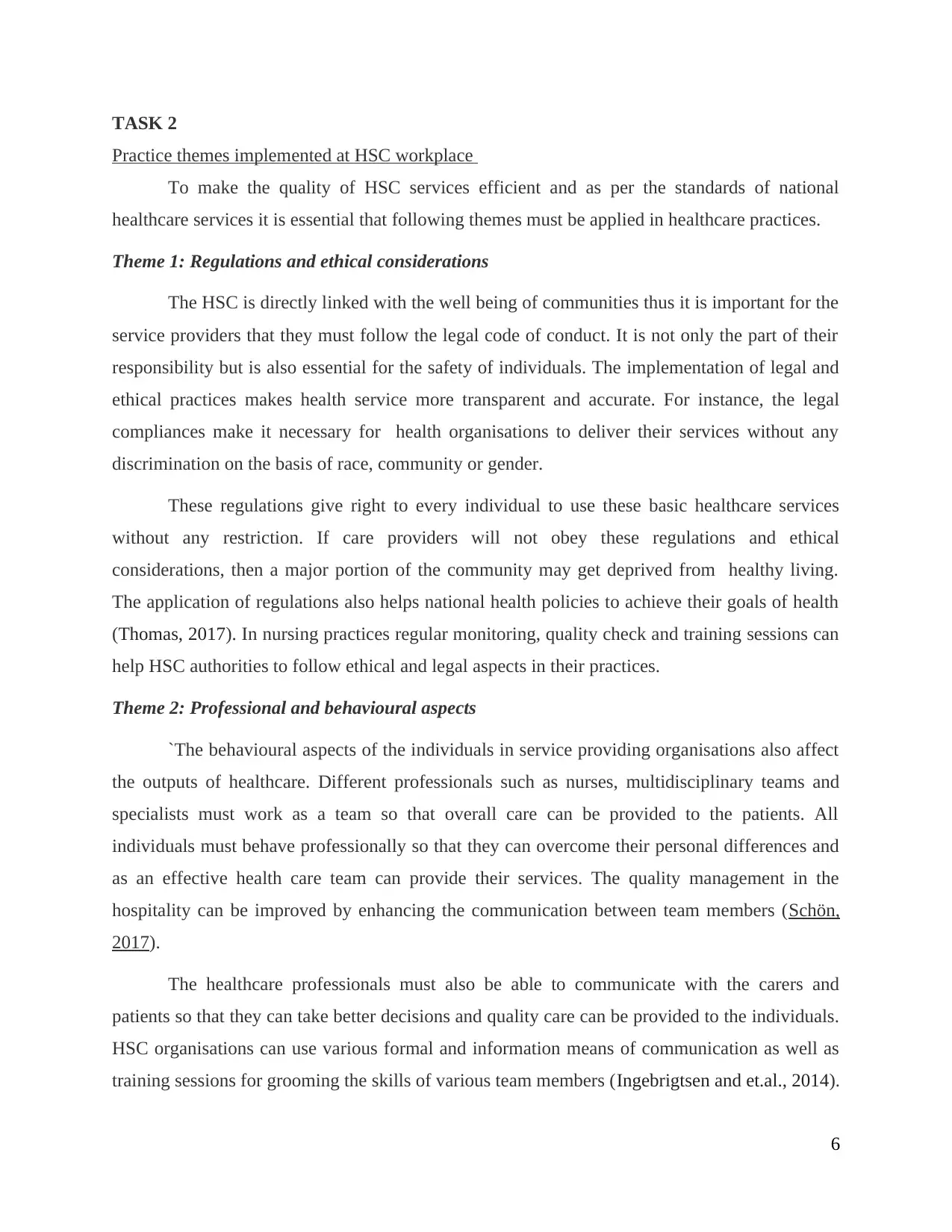
TASK 2
Practice themes implemented at HSC workplace
To make the quality of HSC services efficient and as per the standards of national
healthcare services it is essential that following themes must be applied in healthcare practices.
Theme 1: Regulations and ethical considerations
The HSC is directly linked with the well being of communities thus it is important for the
service providers that they must follow the legal code of conduct. It is not only the part of their
responsibility but is also essential for the safety of individuals. The implementation of legal and
ethical practices makes health service more transparent and accurate. For instance, the legal
compliances make it necessary for health organisations to deliver their services without any
discrimination on the basis of race, community or gender.
These regulations give right to every individual to use these basic healthcare services
without any restriction. If care providers will not obey these regulations and ethical
considerations, then a major portion of the community may get deprived from healthy living.
The application of regulations also helps national health policies to achieve their goals of health
(Thomas, 2017). In nursing practices regular monitoring, quality check and training sessions can
help HSC authorities to follow ethical and legal aspects in their practices.
Theme 2: Professional and behavioural aspects
`The behavioural aspects of the individuals in service providing organisations also affect
the outputs of healthcare. Different professionals such as nurses, multidisciplinary teams and
specialists must work as a team so that overall care can be provided to the patients. All
individuals must behave professionally so that they can overcome their personal differences and
as an effective health care team can provide their services. The quality management in the
hospitality can be improved by enhancing the communication between team members (Schön,
2017).
The healthcare professionals must also be able to communicate with the carers and
patients so that they can take better decisions and quality care can be provided to the individuals.
HSC organisations can use various formal and information means of communication as well as
training sessions for grooming the skills of various team members (Ingebrigtsen and et.al., 2014).
6
Practice themes implemented at HSC workplace
To make the quality of HSC services efficient and as per the standards of national
healthcare services it is essential that following themes must be applied in healthcare practices.
Theme 1: Regulations and ethical considerations
The HSC is directly linked with the well being of communities thus it is important for the
service providers that they must follow the legal code of conduct. It is not only the part of their
responsibility but is also essential for the safety of individuals. The implementation of legal and
ethical practices makes health service more transparent and accurate. For instance, the legal
compliances make it necessary for health organisations to deliver their services without any
discrimination on the basis of race, community or gender.
These regulations give right to every individual to use these basic healthcare services
without any restriction. If care providers will not obey these regulations and ethical
considerations, then a major portion of the community may get deprived from healthy living.
The application of regulations also helps national health policies to achieve their goals of health
(Thomas, 2017). In nursing practices regular monitoring, quality check and training sessions can
help HSC authorities to follow ethical and legal aspects in their practices.
Theme 2: Professional and behavioural aspects
`The behavioural aspects of the individuals in service providing organisations also affect
the outputs of healthcare. Different professionals such as nurses, multidisciplinary teams and
specialists must work as a team so that overall care can be provided to the patients. All
individuals must behave professionally so that they can overcome their personal differences and
as an effective health care team can provide their services. The quality management in the
hospitality can be improved by enhancing the communication between team members (Schön,
2017).
The healthcare professionals must also be able to communicate with the carers and
patients so that they can take better decisions and quality care can be provided to the individuals.
HSC organisations can use various formal and information means of communication as well as
training sessions for grooming the skills of various team members (Ingebrigtsen and et.al., 2014).
6
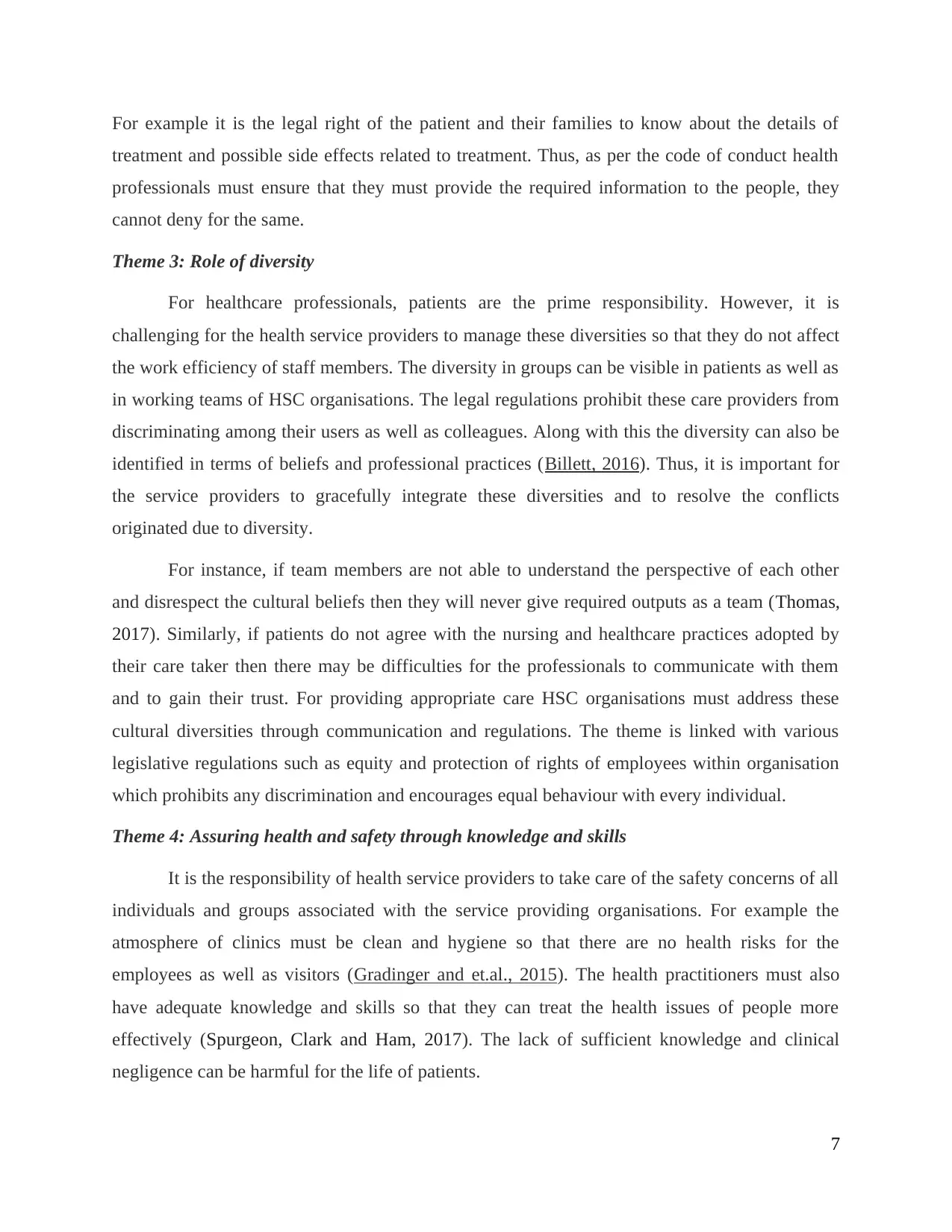
For example it is the legal right of the patient and their families to know about the details of
treatment and possible side effects related to treatment. Thus, as per the code of conduct health
professionals must ensure that they must provide the required information to the people, they
cannot deny for the same.
Theme 3: Role of diversity
For healthcare professionals, patients are the prime responsibility. However, it is
challenging for the health service providers to manage these diversities so that they do not affect
the work efficiency of staff members. The diversity in groups can be visible in patients as well as
in working teams of HSC organisations. The legal regulations prohibit these care providers from
discriminating among their users as well as colleagues. Along with this the diversity can also be
identified in terms of beliefs and professional practices (Billett, 2016). Thus, it is important for
the service providers to gracefully integrate these diversities and to resolve the conflicts
originated due to diversity.
For instance, if team members are not able to understand the perspective of each other
and disrespect the cultural beliefs then they will never give required outputs as a team (Thomas,
2017). Similarly, if patients do not agree with the nursing and healthcare practices adopted by
their care taker then there may be difficulties for the professionals to communicate with them
and to gain their trust. For providing appropriate care HSC organisations must address these
cultural diversities through communication and regulations. The theme is linked with various
legislative regulations such as equity and protection of rights of employees within organisation
which prohibits any discrimination and encourages equal behaviour with every individual.
Theme 4: Assuring health and safety through knowledge and skills
It is the responsibility of health service providers to take care of the safety concerns of all
individuals and groups associated with the service providing organisations. For example the
atmosphere of clinics must be clean and hygiene so that there are no health risks for the
employees as well as visitors (Gradinger and et.al., 2015). The health practitioners must also
have adequate knowledge and skills so that they can treat the health issues of people more
effectively (Spurgeon, Clark and Ham, 2017). The lack of sufficient knowledge and clinical
negligence can be harmful for the life of patients.
7
treatment and possible side effects related to treatment. Thus, as per the code of conduct health
professionals must ensure that they must provide the required information to the people, they
cannot deny for the same.
Theme 3: Role of diversity
For healthcare professionals, patients are the prime responsibility. However, it is
challenging for the health service providers to manage these diversities so that they do not affect
the work efficiency of staff members. The diversity in groups can be visible in patients as well as
in working teams of HSC organisations. The legal regulations prohibit these care providers from
discriminating among their users as well as colleagues. Along with this the diversity can also be
identified in terms of beliefs and professional practices (Billett, 2016). Thus, it is important for
the service providers to gracefully integrate these diversities and to resolve the conflicts
originated due to diversity.
For instance, if team members are not able to understand the perspective of each other
and disrespect the cultural beliefs then they will never give required outputs as a team (Thomas,
2017). Similarly, if patients do not agree with the nursing and healthcare practices adopted by
their care taker then there may be difficulties for the professionals to communicate with them
and to gain their trust. For providing appropriate care HSC organisations must address these
cultural diversities through communication and regulations. The theme is linked with various
legislative regulations such as equity and protection of rights of employees within organisation
which prohibits any discrimination and encourages equal behaviour with every individual.
Theme 4: Assuring health and safety through knowledge and skills
It is the responsibility of health service providers to take care of the safety concerns of all
individuals and groups associated with the service providing organisations. For example the
atmosphere of clinics must be clean and hygiene so that there are no health risks for the
employees as well as visitors (Gradinger and et.al., 2015). The health practitioners must also
have adequate knowledge and skills so that they can treat the health issues of people more
effectively (Spurgeon, Clark and Ham, 2017). The lack of sufficient knowledge and clinical
negligence can be harmful for the life of patients.
7
⊘ This is a preview!⊘
Do you want full access?
Subscribe today to unlock all pages.

Trusted by 1+ million students worldwide
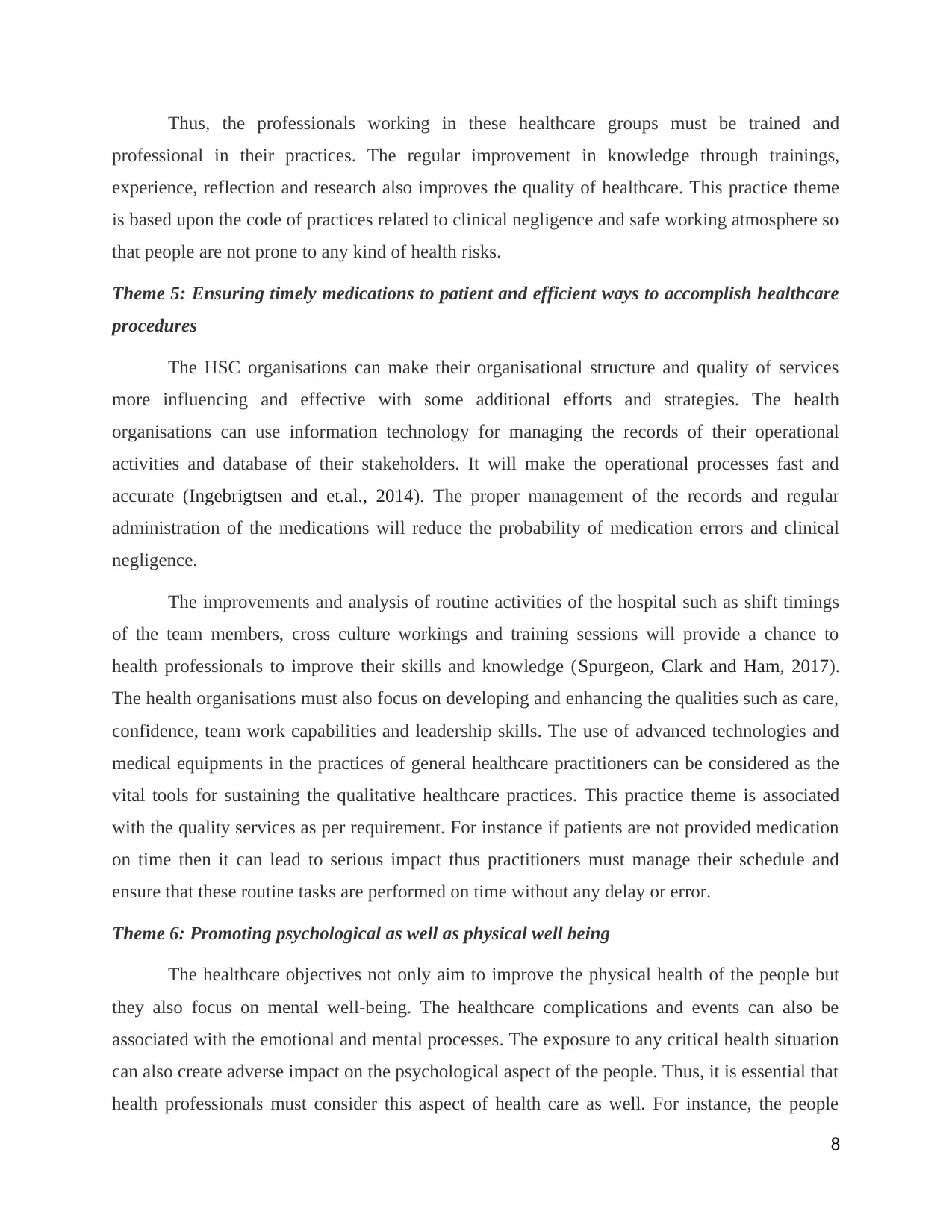
Thus, the professionals working in these healthcare groups must be trained and
professional in their practices. The regular improvement in knowledge through trainings,
experience, reflection and research also improves the quality of healthcare. This practice theme
is based upon the code of practices related to clinical negligence and safe working atmosphere so
that people are not prone to any kind of health risks.
Theme 5: Ensuring timely medications to patient and efficient ways to accomplish healthcare
procedures
The HSC organisations can make their organisational structure and quality of services
more influencing and effective with some additional efforts and strategies. The health
organisations can use information technology for managing the records of their operational
activities and database of their stakeholders. It will make the operational processes fast and
accurate (Ingebrigtsen and et.al., 2014). The proper management of the records and regular
administration of the medications will reduce the probability of medication errors and clinical
negligence.
The improvements and analysis of routine activities of the hospital such as shift timings
of the team members, cross culture workings and training sessions will provide a chance to
health professionals to improve their skills and knowledge (Spurgeon, Clark and Ham, 2017).
The health organisations must also focus on developing and enhancing the qualities such as care,
confidence, team work capabilities and leadership skills. The use of advanced technologies and
medical equipments in the practices of general healthcare practitioners can be considered as the
vital tools for sustaining the qualitative healthcare practices. This practice theme is associated
with the quality services as per requirement. For instance if patients are not provided medication
on time then it can lead to serious impact thus practitioners must manage their schedule and
ensure that these routine tasks are performed on time without any delay or error.
Theme 6: Promoting psychological as well as physical well being
The healthcare objectives not only aim to improve the physical health of the people but
they also focus on mental well-being. The healthcare complications and events can also be
associated with the emotional and mental processes. The exposure to any critical health situation
can also create adverse impact on the psychological aspect of the people. Thus, it is essential that
health professionals must consider this aspect of health care as well. For instance, the people
8
professional in their practices. The regular improvement in knowledge through trainings,
experience, reflection and research also improves the quality of healthcare. This practice theme
is based upon the code of practices related to clinical negligence and safe working atmosphere so
that people are not prone to any kind of health risks.
Theme 5: Ensuring timely medications to patient and efficient ways to accomplish healthcare
procedures
The HSC organisations can make their organisational structure and quality of services
more influencing and effective with some additional efforts and strategies. The health
organisations can use information technology for managing the records of their operational
activities and database of their stakeholders. It will make the operational processes fast and
accurate (Ingebrigtsen and et.al., 2014). The proper management of the records and regular
administration of the medications will reduce the probability of medication errors and clinical
negligence.
The improvements and analysis of routine activities of the hospital such as shift timings
of the team members, cross culture workings and training sessions will provide a chance to
health professionals to improve their skills and knowledge (Spurgeon, Clark and Ham, 2017).
The health organisations must also focus on developing and enhancing the qualities such as care,
confidence, team work capabilities and leadership skills. The use of advanced technologies and
medical equipments in the practices of general healthcare practitioners can be considered as the
vital tools for sustaining the qualitative healthcare practices. This practice theme is associated
with the quality services as per requirement. For instance if patients are not provided medication
on time then it can lead to serious impact thus practitioners must manage their schedule and
ensure that these routine tasks are performed on time without any delay or error.
Theme 6: Promoting psychological as well as physical well being
The healthcare objectives not only aim to improve the physical health of the people but
they also focus on mental well-being. The healthcare complications and events can also be
associated with the emotional and mental processes. The exposure to any critical health situation
can also create adverse impact on the psychological aspect of the people. Thus, it is essential that
health professionals must consider this aspect of health care as well. For instance, the people
8
Paraphrase This Document
Need a fresh take? Get an instant paraphrase of this document with our AI Paraphraser
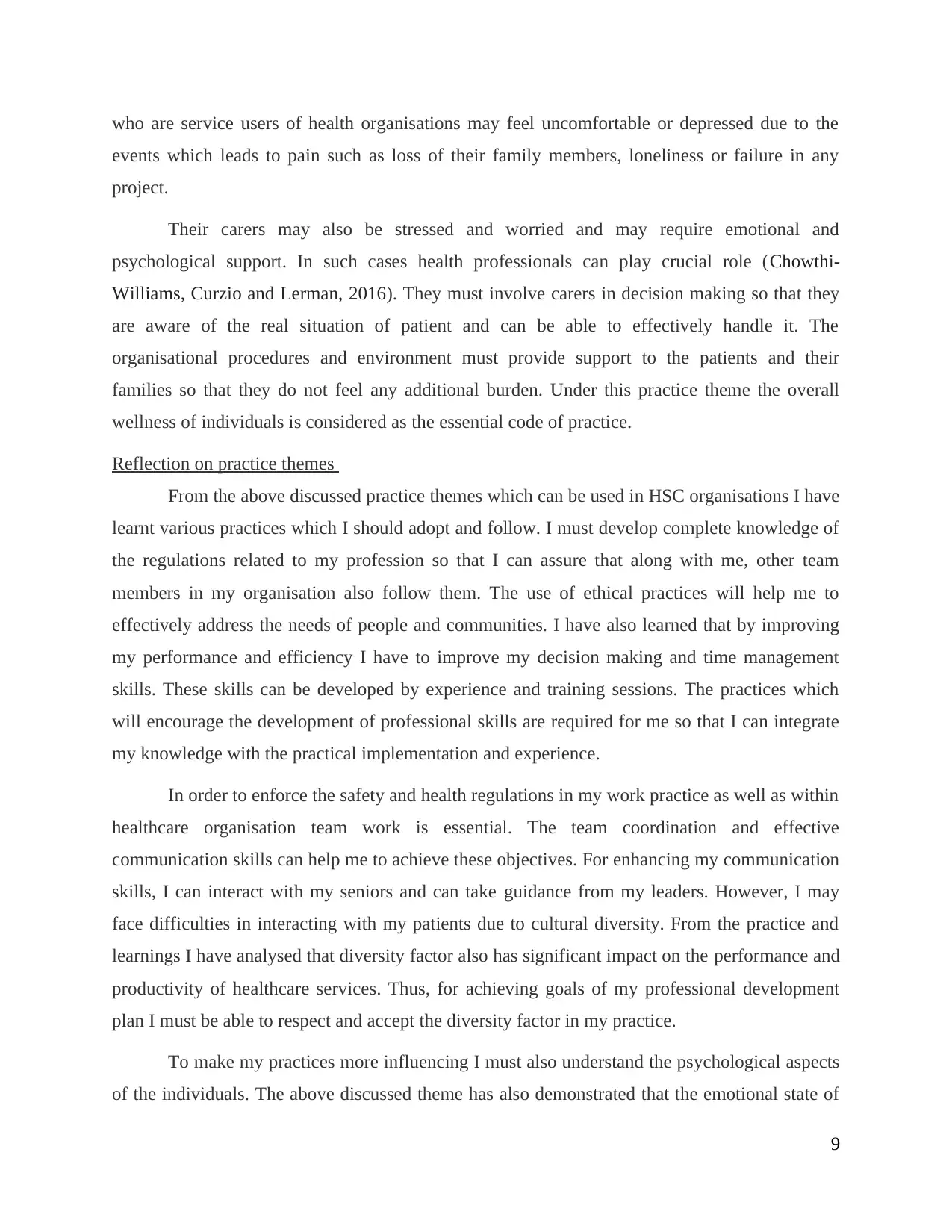
who are service users of health organisations may feel uncomfortable or depressed due to the
events which leads to pain such as loss of their family members, loneliness or failure in any
project.
Their carers may also be stressed and worried and may require emotional and
psychological support. In such cases health professionals can play crucial role (Chowthi-
Williams, Curzio and Lerman, 2016). They must involve carers in decision making so that they
are aware of the real situation of patient and can be able to effectively handle it. The
organisational procedures and environment must provide support to the patients and their
families so that they do not feel any additional burden. Under this practice theme the overall
wellness of individuals is considered as the essential code of practice.
Reflection on practice themes
From the above discussed practice themes which can be used in HSC organisations I have
learnt various practices which I should adopt and follow. I must develop complete knowledge of
the regulations related to my profession so that I can assure that along with me, other team
members in my organisation also follow them. The use of ethical practices will help me to
effectively address the needs of people and communities. I have also learned that by improving
my performance and efficiency I have to improve my decision making and time management
skills. These skills can be developed by experience and training sessions. The practices which
will encourage the development of professional skills are required for me so that I can integrate
my knowledge with the practical implementation and experience.
In order to enforce the safety and health regulations in my work practice as well as within
healthcare organisation team work is essential. The team coordination and effective
communication skills can help me to achieve these objectives. For enhancing my communication
skills, I can interact with my seniors and can take guidance from my leaders. However, I may
face difficulties in interacting with my patients due to cultural diversity. From the practice and
learnings I have analysed that diversity factor also has significant impact on the performance and
productivity of healthcare services. Thus, for achieving goals of my professional development
plan I must be able to respect and accept the diversity factor in my practice.
To make my practices more influencing I must also understand the psychological aspects
of the individuals. The above discussed theme has also demonstrated that the emotional state of
9
events which leads to pain such as loss of their family members, loneliness or failure in any
project.
Their carers may also be stressed and worried and may require emotional and
psychological support. In such cases health professionals can play crucial role (Chowthi-
Williams, Curzio and Lerman, 2016). They must involve carers in decision making so that they
are aware of the real situation of patient and can be able to effectively handle it. The
organisational procedures and environment must provide support to the patients and their
families so that they do not feel any additional burden. Under this practice theme the overall
wellness of individuals is considered as the essential code of practice.
Reflection on practice themes
From the above discussed practice themes which can be used in HSC organisations I have
learnt various practices which I should adopt and follow. I must develop complete knowledge of
the regulations related to my profession so that I can assure that along with me, other team
members in my organisation also follow them. The use of ethical practices will help me to
effectively address the needs of people and communities. I have also learned that by improving
my performance and efficiency I have to improve my decision making and time management
skills. These skills can be developed by experience and training sessions. The practices which
will encourage the development of professional skills are required for me so that I can integrate
my knowledge with the practical implementation and experience.
In order to enforce the safety and health regulations in my work practice as well as within
healthcare organisation team work is essential. The team coordination and effective
communication skills can help me to achieve these objectives. For enhancing my communication
skills, I can interact with my seniors and can take guidance from my leaders. However, I may
face difficulties in interacting with my patients due to cultural diversity. From the practice and
learnings I have analysed that diversity factor also has significant impact on the performance and
productivity of healthcare services. Thus, for achieving goals of my professional development
plan I must be able to respect and accept the diversity factor in my practice.
To make my practices more influencing I must also understand the psychological aspects
of the individuals. The above discussed theme has also demonstrated that the emotional state of
9
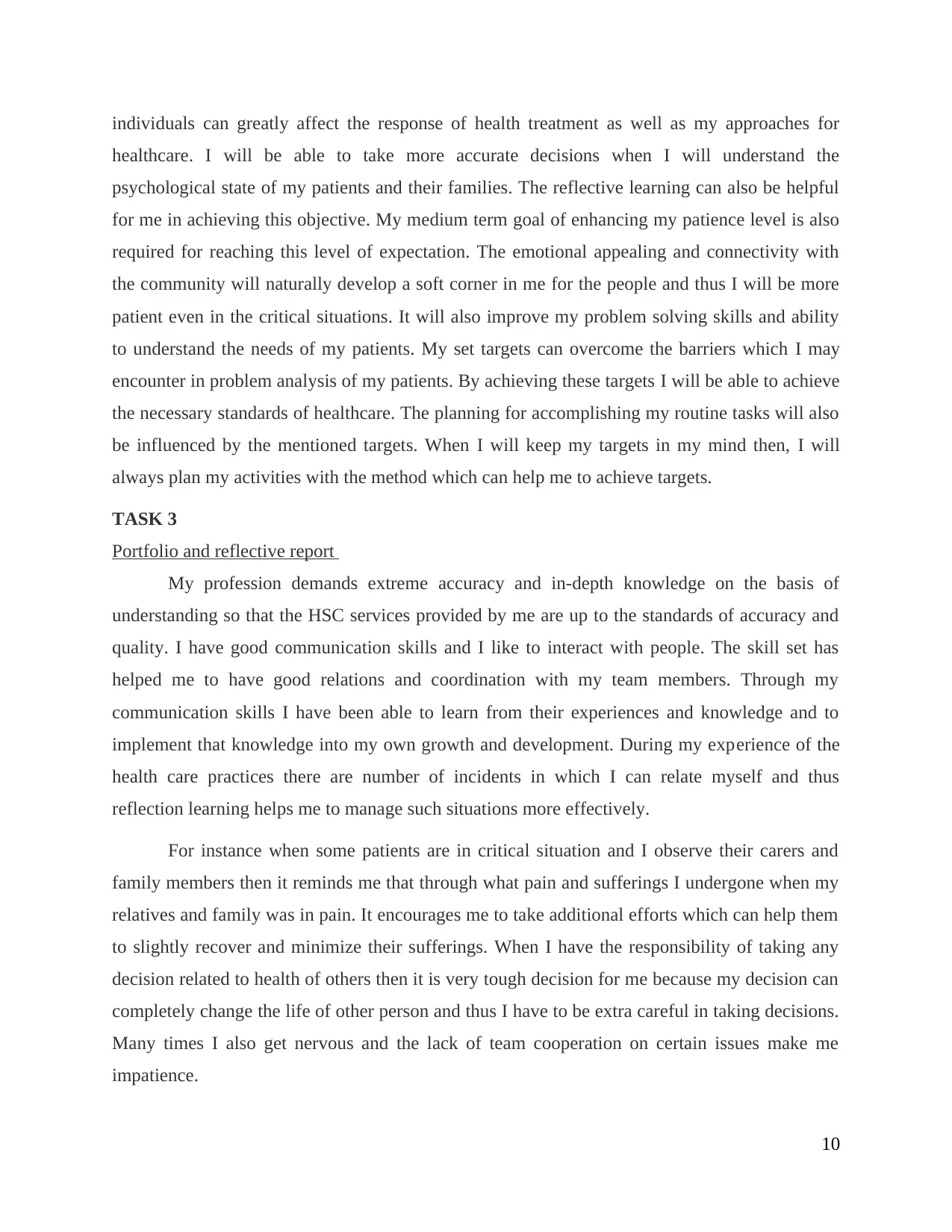
individuals can greatly affect the response of health treatment as well as my approaches for
healthcare. I will be able to take more accurate decisions when I will understand the
psychological state of my patients and their families. The reflective learning can also be helpful
for me in achieving this objective. My medium term goal of enhancing my patience level is also
required for reaching this level of expectation. The emotional appealing and connectivity with
the community will naturally develop a soft corner in me for the people and thus I will be more
patient even in the critical situations. It will also improve my problem solving skills and ability
to understand the needs of my patients. My set targets can overcome the barriers which I may
encounter in problem analysis of my patients. By achieving these targets I will be able to achieve
the necessary standards of healthcare. The planning for accomplishing my routine tasks will also
be influenced by the mentioned targets. When I will keep my targets in my mind then, I will
always plan my activities with the method which can help me to achieve targets.
TASK 3
Portfolio and reflective report
My profession demands extreme accuracy and in-depth knowledge on the basis of
understanding so that the HSC services provided by me are up to the standards of accuracy and
quality. I have good communication skills and I like to interact with people. The skill set has
helped me to have good relations and coordination with my team members. Through my
communication skills I have been able to learn from their experiences and knowledge and to
implement that knowledge into my own growth and development. During my experience of the
health care practices there are number of incidents in which I can relate myself and thus
reflection learning helps me to manage such situations more effectively.
For instance when some patients are in critical situation and I observe their carers and
family members then it reminds me that through what pain and sufferings I undergone when my
relatives and family was in pain. It encourages me to take additional efforts which can help them
to slightly recover and minimize their sufferings. When I have the responsibility of taking any
decision related to health of others then it is very tough decision for me because my decision can
completely change the life of other person and thus I have to be extra careful in taking decisions.
Many times I also get nervous and the lack of team cooperation on certain issues make me
impatience.
10
healthcare. I will be able to take more accurate decisions when I will understand the
psychological state of my patients and their families. The reflective learning can also be helpful
for me in achieving this objective. My medium term goal of enhancing my patience level is also
required for reaching this level of expectation. The emotional appealing and connectivity with
the community will naturally develop a soft corner in me for the people and thus I will be more
patient even in the critical situations. It will also improve my problem solving skills and ability
to understand the needs of my patients. My set targets can overcome the barriers which I may
encounter in problem analysis of my patients. By achieving these targets I will be able to achieve
the necessary standards of healthcare. The planning for accomplishing my routine tasks will also
be influenced by the mentioned targets. When I will keep my targets in my mind then, I will
always plan my activities with the method which can help me to achieve targets.
TASK 3
Portfolio and reflective report
My profession demands extreme accuracy and in-depth knowledge on the basis of
understanding so that the HSC services provided by me are up to the standards of accuracy and
quality. I have good communication skills and I like to interact with people. The skill set has
helped me to have good relations and coordination with my team members. Through my
communication skills I have been able to learn from their experiences and knowledge and to
implement that knowledge into my own growth and development. During my experience of the
health care practices there are number of incidents in which I can relate myself and thus
reflection learning helps me to manage such situations more effectively.
For instance when some patients are in critical situation and I observe their carers and
family members then it reminds me that through what pain and sufferings I undergone when my
relatives and family was in pain. It encourages me to take additional efforts which can help them
to slightly recover and minimize their sufferings. When I have the responsibility of taking any
decision related to health of others then it is very tough decision for me because my decision can
completely change the life of other person and thus I have to be extra careful in taking decisions.
Many times I also get nervous and the lack of team cooperation on certain issues make me
impatience.
10
⊘ This is a preview!⊘
Do you want full access?
Subscribe today to unlock all pages.

Trusted by 1+ million students worldwide
1 out of 18
Related Documents
Your All-in-One AI-Powered Toolkit for Academic Success.
+13062052269
info@desklib.com
Available 24*7 on WhatsApp / Email
![[object Object]](/_next/static/media/star-bottom.7253800d.svg)
Unlock your academic potential
Copyright © 2020–2026 A2Z Services. All Rights Reserved. Developed and managed by ZUCOL.




